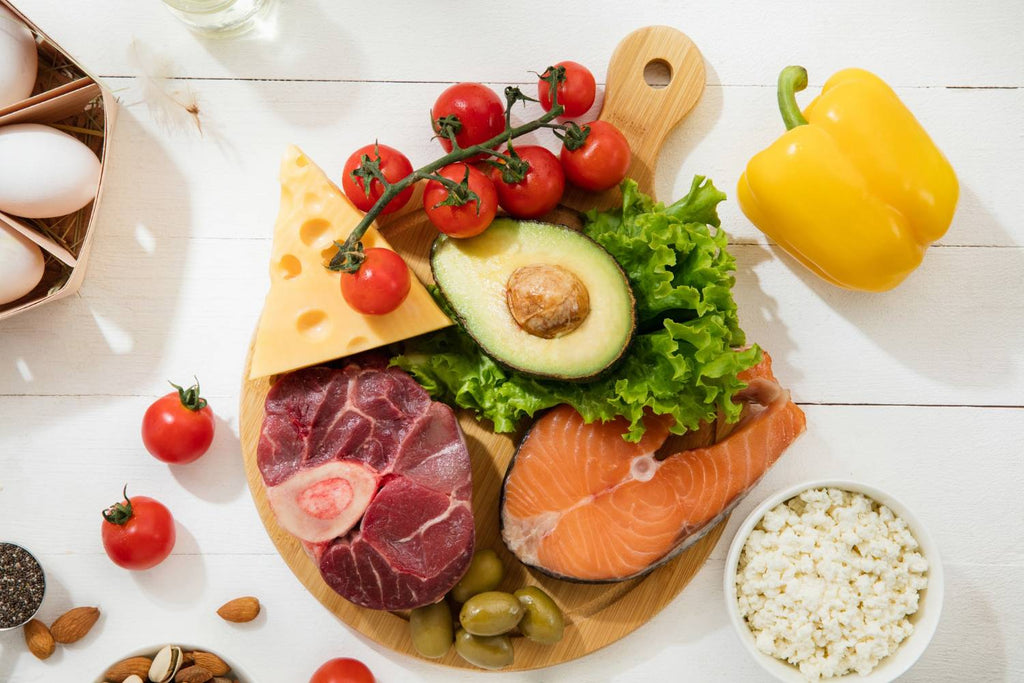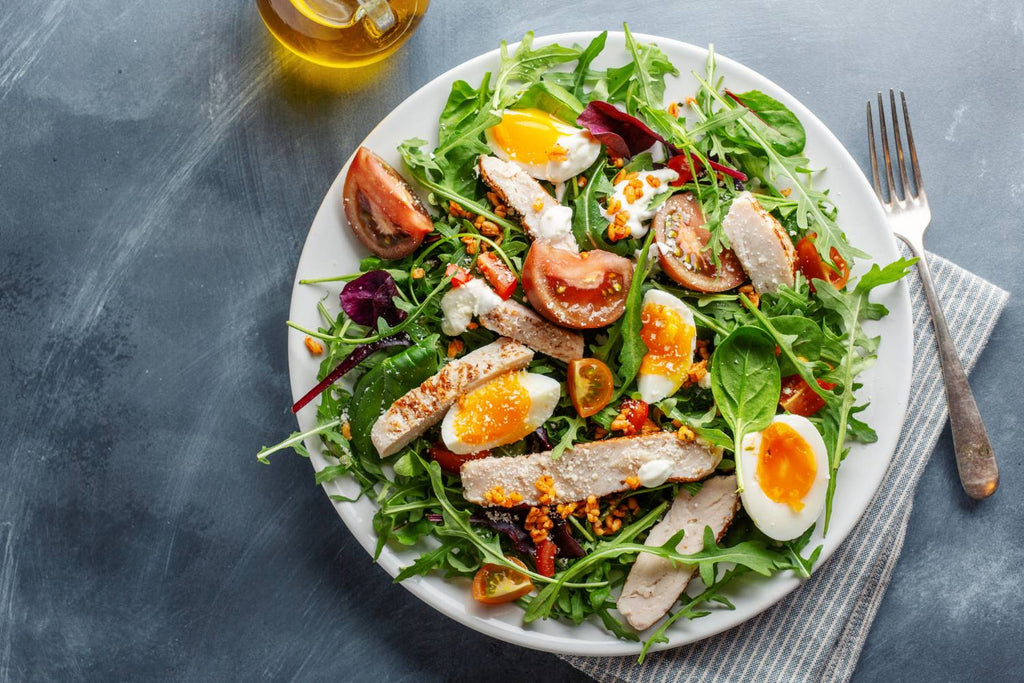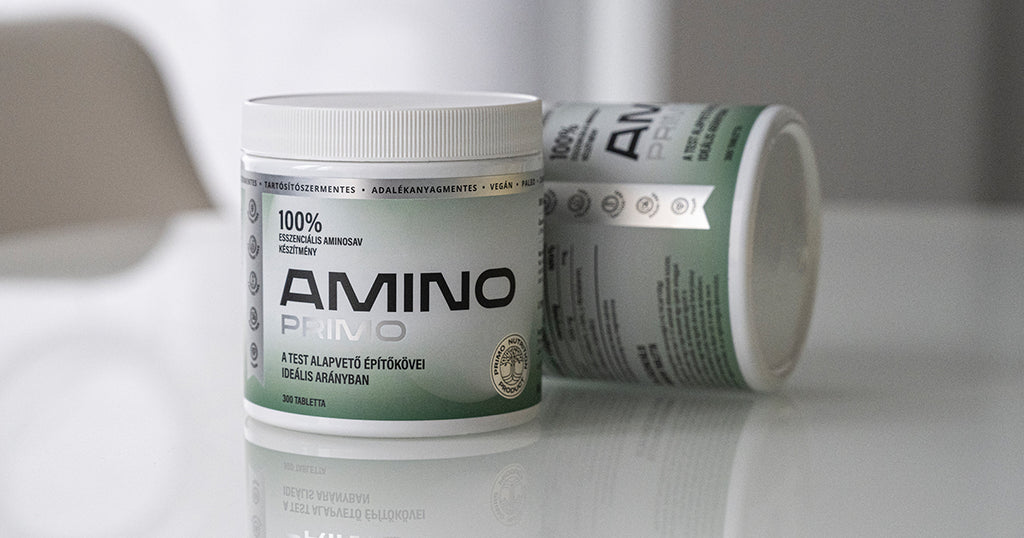Here’s why you should take amino acids even if you don’t lift weights
[Before you dive in: this article takes about 10 minutes to read, as we’ve included all the essential details that might be useful for you right now. But we totally get it if you’re short on time or patience at the moment. That’s why we’ve summarized the key points in the 3-minute video below, and you can always come back to read the rest later.]
Since we've tried to pack all available information into this post, it’s turned out pretty lengthy. Feel free to use the following table of contents for easier navigation.
- And Yes, Amino Acids Are Created From Proteins
- How Much Do We Actually Need?
- So, Does That Mean We Should Just Eat a Lot of Protein?
- So How Much Protein Do You Need Each Day?
- Trick Question #1: Are All Proteins the Same?
- Trick Question #2: How Much Does a Piece of Fried Meat Really Do for Your Body?
- Trick Question #3: Does Protein Equal Eternal Life?
- Time for Some Honesty: Do You REALLY Get Enough Protein?
- What Can Amino Acid Deficiency Lead To?
- How Can You Get Enough Amino Acids?
- Here’s What You Should Know About Protein Supplements
- Alright, So Which One Should I Pick?
- In Other Words, Here’s Why Taking Essential Amino Acids Could Be a Smart Choice
- Why haven’t I heard about this from my doctor?
- When Else Might Essential Amino Acid Supplements Be Recommended?
- Are All Amino Acids the Same?
- The Most Important Factor in Choosing an Amino Acid Supplement
- Customer Feedback
- What Else Should You Know About Amino Primo?
- Do You Need This?
I’ve been asked countless times why I take amino acids when I don’t even go to the gym. Those who are regulars in the gym usually know their way around supplements too, so they probably already know whether amino acids are something you eat or drink. (Spoiler: it’s both.)
Meanwhile, the rest of us, the average folks, might only be sure of one thing: amino acids have something to do with proteins.
And Yes, Amino Acids Are Created From Proteins

When you eat "protein"—like meat, fish, eggs, dairy, peas, beans, and other plant-based sources—your digestive system breaks it down into tiny components.
These tiny components are called amino acids. This breakdown is essential because your body uses these amino acids to build all kinds of cells. They make up our muscles, bones, hormones, skin, and even our hair and nails.
How Much Do We Actually Need?
The amount of amino acids available for these processes depends on our diet—specifically, how much and what kind of protein we eat every day.
It’s also important to know that there are many types of amino acids, but eight are considered "essential." They’re called essential because we can only get them from our food.
You can get other amino acids from food too, but if we get enough of these eight in the right amounts, our bodies can create all the other amino acids we need. (Hello, balanced diet!)
So, Does That Mean We Should Just Eat a Lot of Protein?

It might seem like common sense that if we eat a lot of protein, we’ll get all the nutrients we need: strong muscles, healthy bones, balanced hormones, a strong immune system, and hair that grows like crazy. But, as you might guess, it’s not that simple.
If you’re now debating whether to skip that bacon and eggs or rethink pounding that pork chop for lunch, keep reading a little longer.
So How Much Protein Do You Need Each Day?
We probably learned this in biology class, but honestly, who remembers? Generally, an average adult needs about 0.8 grams of protein per kilogram of body weight per day. So, you take your weight, multiply it by 0.8, and that’s how much protein you should aim for. Then, divide that by how many meals you eat, and you’ll know how much protein to target per meal.
But keep in mind, this is just a rough estimate for an average adult. If you’re doing physically demanding work, working out more than usual, or dealing with a chronic illness, your needs will be different. And of course, a 60-kilogram person’s protein needs aren’t the same as someone who weighs 100 kilograms, especially when you’re picking out meat at the butcher’s.
Trick Question #1: Are All Proteins the Same?
In a way, yes—all proteins provide amino acids. And, of course, they also give you calories. But your body processes different protein sources in different ways, since they vary in how long they take to digest and how easy they are to break down. Plus, each type has its own calorie profile, meaning they contain different amounts of fat, sugar, and carbs.
Trick Question #2: How Much Does a Piece of Fried Meat Really Do for Your Body?

We also can’t ignore that only a portion of the protein we consume actually gets used by the body. This means that if you eat a big piece of fried chicken, only part of it will be turned into amino acids. The rest will show up as calories during digestion, which you can either burn off or store as fat.
To put it into numbers, an average daily menu contains around 40 grams (0.088 pounds) of protein (depending on the type of protein), but only about 10 grams (0.022 pounds) of that will be converted into amino acids. Meanwhile, our daily amino acid requirement is roughly 30 grams (0.066 pounds). (Amino acids, not protein!)
So, to get those 30 grams (0.066 pounds) of amino acids, you’d need to eat about 120 grams (0.264 pounds) of protein, which is the amount a 150 kg (330-pound) person would need. That means if you weigh 75 kg (165 pounds), you’d be consuming twice as much protein (and possibly calories) as you actually need.
On the other hand, if you’re eating less protein (based on the number you calculated earlier), you’ve probably realized that you might not be getting enough (or enough quality) protein, and therefore not enough building blocks for your body.
Trick Question #3: Does Protein Equal Eternal Life?
We like to joke that once you hit 40, you're already hitting the downhill, but it doesn’t have to feel that way. You don’t have to feel like you’re on the decline just because you’re getting older.
That said, it’s a fact that as we age, some of our bodily functions aren’t quite the same as they were 5-10 years ago. There are obvious signs, like our muscles and joints becoming less flexible.
But there are also less obvious, yet super important things, like our ability to digest protein, which tends to slow down after 40.
What this really means is that even if you’re still eating the same amount of fried chicken every Sunday, over time, your body will absorb fewer amino acids from it.
Time for Some Honesty: Do You REALLY Get Enough Protein?
Let’s be real — most of us would probably say “yes” right off the bat. After all, in our minds, protein means stuff like steak, fried chicken, sausages, deli meats, dairy, and let’s not forget plant-based proteins like peas or beans. We eat these things pretty regularly, so we must be getting enough, right?
But can you actually spot the signs of a protein deficiency in yourself? Even the subtle ones?
What Can Amino Acid Deficiency Lead To?
A lack of amino acids, or in more scientific terms, a protein deficiency, can trigger a whole range of symptoms. Basically, it can lead to anything from the mild to the downright debilitating.
- First, there are the everyday signs: brittle nails, dull hair, struggling on the treadmill and dealing with soreness for days afterward.
- We try to make up for hard mornings with gallons of coffee, chalking it up to “spring fatigue” or whatever season we’re in.
- We might find it takes longer to shake off a cold, or we seem to catch something new every month.
- On top of that, a lack of protein can set the stage for more serious health issues, like high blood pressure, blood sugar imbalances, or hormone issues.
And once one domino falls, it can lead to a cascade of other symptoms.
Chances are, you hadn’t connected these issues to low protein intake, right? Don’t worry; you’re not alone. Most of us never learned this in school since knowledge about the effects of amino acid deficiency is only now coming to light.
How Can You Get Enough Amino Acids?
You’ve got a few options to make sure you’re getting enough—beyond aiming for a well-balanced diet—but none are entirely hassle-free.
- One route is to increase your intake of protein-rich foods, but that also means a lot of extra calories, which over weeks or months can lead to unwanted weight gain. And if you try to balance it out by exercising more, you’re right back to needing even more “fuel.”
- Alternatively, you can turn to supplements, like essential amino acids, BCAAs, or protein powders. These options can help, but they’re artificially produced and come in varying degrees of quality, so it’s worth paying attention to what you’re getting.
Here’s What You Should Know About Protein Supplements
Protein powders
often mixed with water or milk—are popular pre- or post-workout supplements. They’re convenient, quick to prepare, and now come in a variety of flavors beyond the usual vanilla, chocolate, and strawberry. The downside? Many protein powders contain a fair share of additives and fillers, and their absorption rate is relatively low (more on that below). Plus, don’t forget to account for the extra calories they bring.
If you have trouble digesting whey protein (experiencing bloating or other digestive issues), you might consider plant-based options, like rice or pea protein. These may be gentler on the stomach, though they often come with less conventional flavors and a “grittier” texture, making them a bit less enjoyable.
Whey protein, one of the most popular options, has a utilization rate of only about 16%, meaning that just a small portion of the protein you consume will be converted into usable amino acids for your body. The rest? Mostly calories you’ll either need to burn off or store as fat.
Let’s break down the math for a clearer picture. An average serving of protein powder might contain 32 grams (1.13 ounces) of powder, providing roughly 24 grams (0.85 ounces) of protein.
However, with whey or other dairy-based proteins, only around 16% of that protein will be used to produce amino acids—giving you about 3.84 grams (0.14 ounces) of amino acids per serving. To meet the daily recommended amount of 30 grams (1.06 ounces) of amino acids for optimal health, you’d need a lot more protein than one serving of powder provides.
BCAA (branched-chain amino acid) supplements
are primarily targeted at athletes and are most effective when taken before a workout. They can enhance performance and aid in muscle recovery, offering noticeable benefits for those who exercise intensively. However, one drawback is that BCAA supplements contain only 3 out of the 8 essential amino acids.In terms of efficiency, BCAAs don’t rank very high: only about 1% of what you consume actually goes toward protein building in the body. The rest largely contributes to overall calorie intake, providing limited protein-synthesis benefits.
Essential amino acid (EAA) supplements
contain all 8 of the amino acids the body can’t produce on its own—and some products even add a ninth, histidine. While histidine is most critical during childhood growth, it can also aid in post-exercise recovery. That said, we can typically get enough histidine through our diet or the body can synthesize it from the 8 core essential amino acids.
One major advantage of EAAs is that they bypass digestion and are quickly absorbed into the bloodstream, delivering benefits almost instantly without adding extra calories. This means you won’t have to burn off any extra intake. However, choosing a supplement with the wrong balance or quantity of amino acids—or one with unwanted additives—can reduce the product’s effectiveness and may lead to unintended side effects.
Alright, So Which One Should I Pick?

Your choice largely depends on factors like your age, lifestyle, how much you work out, your diet, and whether you have any persistent health symptoms or medical conditions.
We recommend BCAA primarily for people who train multiple times a week and want to improve their performance and speed up recovery. However, if you need a complete amino acid supplement, BCAA alone won’t be enough, as it only contains three essential amino acids.
Whey or plant-based protein powder might be ideal if you don’t have digestive issues with these options and are focused on your diet and workout routine to achieve specific fitness goals. Just be mindful of the calories and any unnecessary additives you might be getting along with these.
Essential amino acid supplements are like a wildcard—they can be a great choice for both performance and recovery if you’re lifting, or even if you're spending the day at a keyboard, watching your diet. It’s all about the dosage. Plus, capsule or tablet forms don’t add extra calories, so there’s nothing to “burn off” later.
We’d also add that at a certain level, combining different types of supplements can help you reach the best possible results.
In Other Words, Here’s Why Taking Essential Amino Acids Could Be a Smart Choice
- You’re giving your body the most valuable nutrients without any extra fats, carbs, or sugars.
- They don’t require additional digestion, so you can take them even if you’re on a special diet (like a gallbladder-friendly diet) or if your digestion isn’t quite what it used to be.
- Choosing a clean supplement with no fillers or additives could be a far better option than, say, chicken raised on antibiotics and steroids with no exposure to sunlight.
- You’re not adding any extra calories, unlike if you were to add an extra meal to your day—or double up on fried chicken at lunch.
- Taken before a workout, essential amino acids can help boost your performance, and afterward, they can support faster recovery.
- They’re also a good alternative if you’re not a fan of protein powders or their artificial additives and overly sweet flavors.
Why Haven’t I Heard About This From My Doctor?
Honestly, we can’t say for sure. From our experience, doctors who have come across essential amino acids through treating patients with serious conditions are often genuinely surprised and interested in learning more.
Primary care doctors, in our opinion, are often so overwhelmed with their workload that they might not have the time to look into every new (or seemingly new) supplement. If you happen to be a primary care physician, feel free to share your thoughts with us through our contact details.
When Else Might Essential Amino Acid Supplements Be Recommended?
- If you consume an average amount of meat and dairy: It may be beneficial to supplement your intake to ensure you're getting enough amino acids.
- If you consume less than average amounts of meat and dairy: Especially if you lack the time, energy, or knowledge to maintain a truly balanced diet.
- If your body is under higher demands: This could include physical labor, intense workouts, or even stressful periods, all of which can increase your amino acid requirements.
- During viral or bacterial infections: Adequate nutrient intake can help combat illness by supporting immune cells without depleting essential proteins, like those in muscles.
- For chronic conditions: Supplementing can be beneficial alongside dietary management of issues like high blood pressure, diabetes, and joint problems.
- For physical injuries: Whether from sports or an accident, amino acids can aid in faster muscle, bone, and skin recovery.
- As a diet support during weight loss: While cutting calories, amino acids can help prevent muscle loss by providing a crucial nutrient source.
- For growing bodies: Children and teens benefit from the extra nutrients needed for cellular growth and overall development.
- For adults over 40: Protein digestion efficiency tends to decline, so the same intake may no longer be sufficient, making supplementation increasingly valuable.
Are All Amino Acids the Same?

Only as much as every chocolate bar is the same—and we’re talking about differences in quality, ingredients, and content.
First off, it's a good idea to scan the ingredients list, particularly for additives or fillers, which can vary widely by product. How much of these you’re comfortable consuming is ultimately a personal choice.
We formulated Amino Primo specifically to be free from any extra additives or fillers, containing only the 8 essential amino acids.
Next, consider how many grams (ounces) of essential amino acids are in each serving. Generally, products on the market provide around 3-6 grams (0.11–0.21 ounces) of essential amino acids per daily serving, with a single container typically containing enough for 20-30 days, depending on the serving size.
For Amino Primo, the recommended daily dose is 2x5 tablets, providing a total of 10 grams (0.35 ounces) of essential amino acids per day to support your body’s needs for 30 days.
The Most Important Factor in Choosing an Amino Acid Supplement
When we created Amino Primo, our primary focus was to develop a product that the body could use as efficiently as possible. We wanted to ensure that the body could make the most out of every dose, with minimal waste. Achieving this required the precise balance and amounts of all 8 essential amino acids.
To simplify, processing protein in the body typically results in waste byproducts like urea, uric acid, and ammonia, which the kidneys then have to filter out. An amino acid supplement with an ideal balance, however, doesn’t produce these ammonia byproducts, keeping the liver and kidneys from experiencing additional strain.
Thanks to dedicated development, Amino Primo offers a 99% utilization rate, providing efficient absorption without liver- or kidney-taxing byproducts. (This is worth comparing to the absorption rates of other protein supplements.)

It’s easy to see why, if you’re taking a supplement daily or weekly, it’s better for it to be as gentle as possible on your system.
Amino Primo essential amino acids are zero-calorie, with no added sugars, fats, or artificial flavors. This means you’re providing your body with exactly what it needs—nothing more, nothing less.
Customer Feedback
Check out the feedback from our customers on our website and Facebook page, where people share their experiences. These testimonials show just how wide-ranging the benefits of essential amino acids can be. When you give your body the building blocks it needs, you can achieve truly impressive results.
.
"Greater endurance, sharper focus, higher resilience, healthier joints, and an overall smoother-running body—that’s what Amino Primo delivers with its ideal formula. It truly contains what it claims, and the benefits are genuinely impressive.” |
"Because of digestive issues and a bile-restricted diet, my food choices were pretty limited. Thanks to the amino acids, I didn’t lose strength or muscle mass. I also believe they sped up my recovery process." |
“I lost 12 kgs before I started taking Amino Primo, but I didn’t feel truly healthy from it. As soon as I began taking Amino, something clicked into place. Not only have the extra kilos stayed off, but I’ve continued to lose weight at a healthy pace. My blood sugar levels also stabilized—from 5.9 before starting Amino to 4.7 at my follow-up test. Physically, I feel much better. I don’t get those intense hunger pangs, and I don’t feel the need to binge." |
"I’m seeing much better results from my workouts—no more muscle soreness like before, and I’m toning up faster. My skin looks healthier, my wrinkles are fading, and my hair has stopped falling out, which had been a constant issue for the past ten years." |
"As soon as I started taking it (my husband ordered it), I felt the positive effects the very next morning. My teeth were always very sensitive, and there was never really a solution. Brushing my teeth used to be a struggle. Now I can easily take it in the morning without upsetting my stomach, and I can work out right after because it doesn’t weigh me down. It’s like my body finally calmed down—something was missing, and now it’s been replenished." |
"I started taking it about 3-4 months ago, at first not even the full daily dose, but gradually, I started to feel changes. For example, I eat less and less frequently, without experiencing that intense hunger. I get full quicker, don’t need to eat as much at once, and prefer drinking more instead. Movement feels easier, I can push my body and muscles harder, and my movements are more confident. Muscle soreness fades faster. My skin feels smoother, my nails are stronger, my hair is also stronger, and a lot of baby hairs have started growing. My digestion has also become more balanced. I’m sure this isn’t the end, but I’ve already noticed these smaller changes." |
What Else Should You Know About Amino Primo?






Amino Primo essential amino acid supplement is gluten-free, lactose-free, sugar-free, and contains no additives or fillers. It absorbs in about 25 minutes, so your body can immediately utilize it. You can experiment freely with the dosage, as you cannot overdose; any excess will be excreted through urine without overloading the liver or kidneys.
Do You Need This?
Let’s put the question another way: would you like to feel good in your own skin? Would you like to leave behind fatigue, sluggishness, or various physical symptoms? Then why not give yourself the chance to achieve that?
Of course, we’re not claiming that essential amino acids will immediately solve all of your body’s issues. Every body is unique, and everyone struggles with different symptoms, usually for different reasons.
However, it is definitely worth asking yourself how your body and health might change if you started giving yourself the best possible nutrients from now on.

